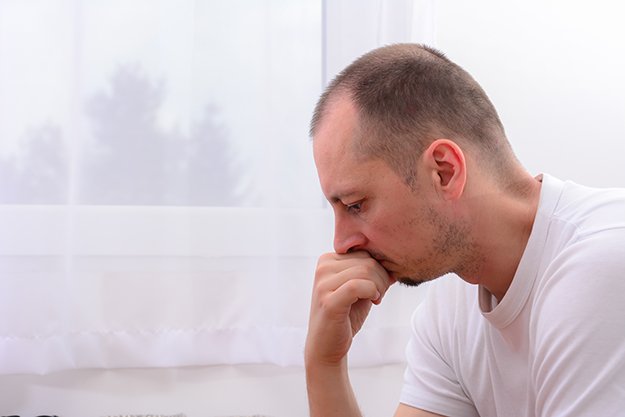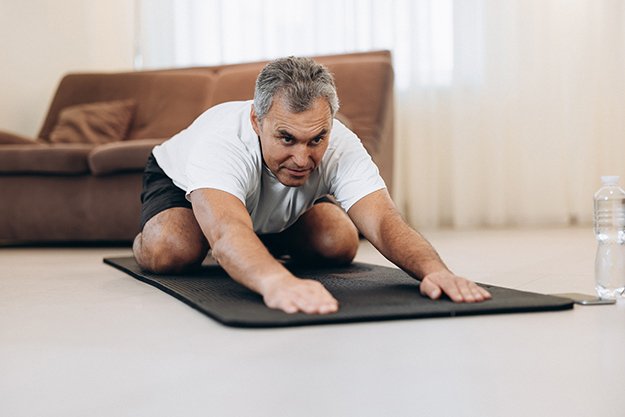
Health Hormone Health
Is sex giving you more stress than fun? Performance anxiety and erectile dysfunction (ED) are the most common sexual problems faced by men. Find out how these issues are related and how to overcome them.
RELATED: Have You Lost Your Edge? How to Feel Better Again

Performance anxiety or ED is often associated with negative thoughts or feelings such as fear and worry, which leads to sexual dysfunction. This may be caused by underlying insecurity about genital size and body image and pressure to please their partner sexually and stress.
Other causes include:
Performance anxiety ED may reflect symptoms differently as everyone responds to different levels of stress and anxiety in a multitude of ways. These symptoms could be premature ejaculation, erectile dysfunction (ED), inability to orgasm, or total loss of interest in sex.
Both men and women experience performance anxiety, but men of all ages tend to face it more often. Although this is considered to be a common occurrence, this type of sexual dysfunction is entirely normal and treatable.
Performance anxiety and ED may be connected in several different ways.
Erectile Dysfunction (ED) is the inability to get or maintain a firm erection because of physical and psychological factors. ED itself and its underlying physical and psychological causes may result in unsatisfactory sex life, feelings of low self-esteem, relationship problems, chronic stress, and anxiety.
Physical conditions that may lead to ED include hypertension, diabetes mellitus, and some lifestyle factors such as lack of exercise, obesity, heart disease, urinary tract infection (UTI), and low testosterone levels. Meanwhile, psychological factors that contribute to ED may be associated with varying levels of depression, anxiety, stress, and other related mental health conditions.
Research points out the interconnected relationship between the state of mind and the ability to perform sexually. When a man experiences stress and anxiety before or during intercourse, this may lead to difficulty getting and maintaining an erection long enough to have sex. This interconnectedness may lead to a lack of self-confidence, feelings of incapability, and further relationship problems.
RELATED: The Science of Self-Assurance: How to be More Self Assured
ACV does not have any nutritional value. This means it has no protein, dietary fiber, no fat, no carbohydrates, and no calories unless sugar is added. Nevertheless, ACV is used as a home remedy for common health conditions, including ED.
The following are several ways you can try to manage overcoming performance anxiety ED:

Exercise improves your stamina, flexibility, and strength in bed. Lack of exercise is linked to symptoms of ED here. To improve your performance, you can do some sit-ups, push-ups, crunches, and squats to strengthen the upper and lower body. Plus, when you exercise, you may feel better about your body image, perform better, and increase overall feelings of self-worth.
Most men who experience performance anxiety focus too much of their energy on what may go wrong during sexual intercourse or perhaps keep reliving that time when they could not perform well from previous encounters. The emotion of embarrassment, worries, and fear may begin to pile up, and this could lead to a vicious cycle of self-doubt.
One thing you can do is focus on your senses and divert your attention to the person or objects around you. This may help block out recurring negative thoughts. In addition, you can enjoy sex itself by making the mood romantic with scented candles and relaxing music.
Most often than not, sexual anxiety stems from the pressure about what your partner might think of you if you fail to perform or rise to the occasion. Being open about what is bothering you may put you at ease and address underlying relationship issues.
Some other alternatives you can try for overcoming performance anxiety ED include:
If performance anxiety keeps recurring after you have tried personal efforts to manage it, seeing a doctor can be a way to help you overcome this issue.
If you are wondering, “Do I have ed or performance anxiety?” it may be best to reach out to your doctor. Your doctor may do a physical exam and recommend what they consider the best ED medication for performance anxiety. If ED causes performance anxiety, testosterone replacement therapy may also be recommended. In addition to all of this, questions may be asked to address mental issues such as what is causing your chronic levels of stress and anxiety.
Sexual problems encompass a variety of factors ranging from physical to psychological. Performance anxiety is perfectly normal, and it commonly happens in men due to stress, pressure, and fear of underperforming, which may lead to ED. This sexual dysfunction is treatable. It is important to see your doctor to determine the underlying causes and help you overcome sexual dysfunction.
Is performance anxiety keeping you from having a satisfying sex life? Opt Health reconnects men with health, happiness, strength, and sexual vitality. Get personalized support and insight from top-tier physicians available for you 24/7. Contact us today.
Up Next:
Your health, your terms. Discover how personalized care can transform not just the way you feel, but how you live.